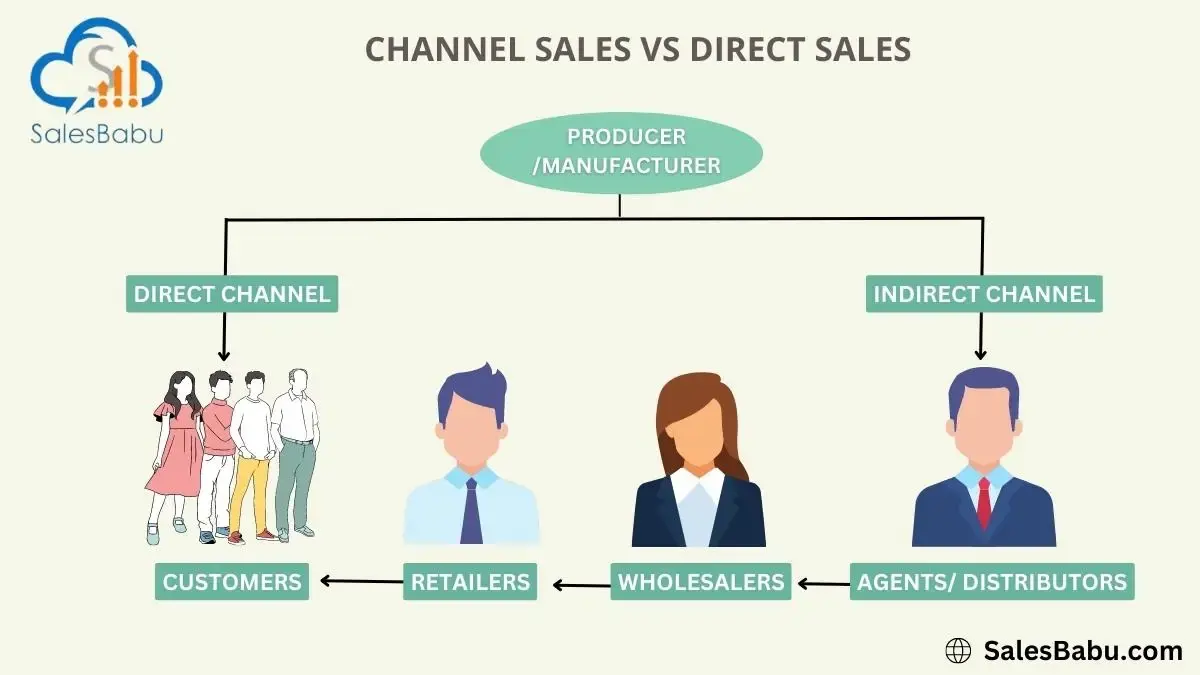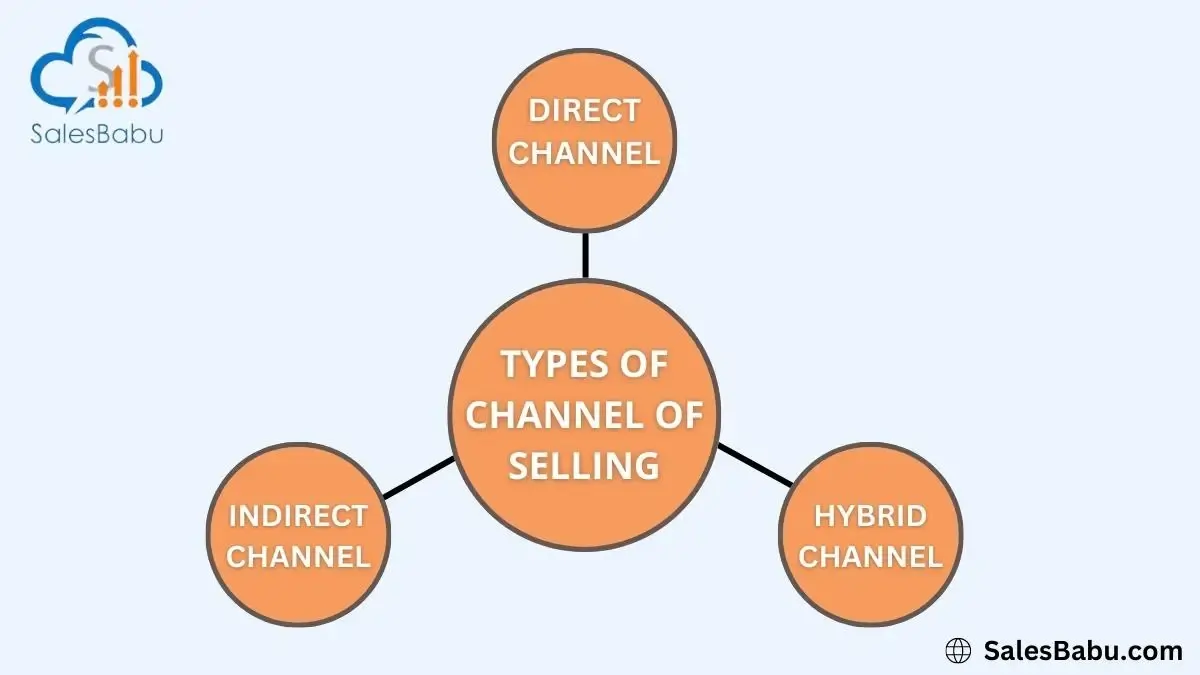What is channel sales?
Channel sales, also known as indirect sales, refers to the process of selling products or services through third-party channels rather than directly to end customers. In channel sales, a company utilizes intermediaries such as distributors, wholesalers, retailers, value-added resellers (VARs), or independent sales agents to reach and sell to customers.
Read More- Top Challenges in CRM Solution Implementation
Channel Sales Pros
1. Customer Success
If your clients need training, implementation support, onboarding, and service, partnering with vendors who offer these services lets your company focus on cracking new business deals without sacrificing your existing clients.
2. Rapid Testing and Experimentation
Third-party channel partners let your company experiment with new client bases, packages, promotions, onboarding, and/or marketing campaigns in a low-stakes environment.
3. Increased Efficiency
One channel manager paired with several various channel partners can bring in the same amount of revenue as five or six salespeople at a fraction of the cost.
4. Trust onto Channel Partner
Gaining a strong relationship when sales partners are trusted names within an organization, in such cases you don’t have to make efforts to fulfill your brand’s reliability. Such products will be viewed as more credible because of their agreements.
5. Prioritize Channel Manager
Rather than teaching other people how to sell your product, a single manager can boost revenue while only charging you a minimal amount as compared to the amount you offer 5 to 6 sales representatives. Holding on to a dedicated professional is pivotal to manage business operations.
Channel Sales Cons
- Less Control Over Sales
- Brand Risk
- Reduced Profits
- Harder to Manage
- Slower Feedback Cycle
- Potential Competition
Uncontrolled Sales
Without keeping a better idea of things,working with partner companies can be high risk. A sales team might not have much monitoring over how your partner company manages deals.
In case the sales team has no interruption in when deals close, such a situation can lead to inconsistent and unpredictable sales in future.
Endangered Reputation
For a successful strategy for selling where you need to keep a good reputation, it becomes necessary to team up with someone who is known for outstanding customer service.
Shorten Profit
After boosting your sales in exchange for bringing leads and confirming the deals, your business partners will get a percentage of the profits where you make less money on each lead.
What are channel partners?
A channel partner is a company that distributes and sells a manufacturer’s product. Channel partners will include resellers, affiliate partners, distributors, value-added providers, resellers, affiliate partners, and independent retailers — basically, anyone who doesn’t work directly for your company.
Read More – Lead Management Software System
What makes a good channel partner?
The process of finding partners is almost similar to finding prospects: First, your company needs to define what an “ideal partner” actually looks like. Let’s take a look at some of the points that your company should look for.
1. Similar Sales Process
Your partner’s sales strategy should be compatible with your company’s strategy.
2. High Technical Expertise
Your company should identify how much technical knowledge your partner would need to sell services or goods of your company. Your company might have to do very little support and education.
3. Aligned With Your Market
Your company should consider whether your partner’s consumers or clients would benefit from your product. .
Read More – Tips For Choosing The Best Distributor Management System
Should my business need a channel sales strategy?
Embracing a channel sales strategy or method can be a tough call for a lot of companies — especially ones who are quite reluctant to trust third parties with their reputation and brand authority. But these strategies come with lots of benefits as well.
How to Create a Sales Channel Program.
- Use a sales channel partnership platform.
- Focus on the partner’s needs.
- Craft relevant and useful content to attract partners.
- Choose a structure for the channel sales partnership.
- Communicate often with your partners.
- Motivate your channel sales partners to sell.
- Offer extra rewards.
Channel Sales vs Direct Sales
In channel sales, a firm sells and distributes its goods and services via a third party. In direct sales, a company sells its products and services directly to the consumer and clients.
Read More- Importance of Sales Tracking Software For Your Business Growth

How to Know if Channel Sales is Right For You
If your company is planning to adopt a channel sales strategy over a direct sales model, it is important to consider the state of your product, company, sales process, and many more. See the following points to know if channel sales are right for your company.
1. Product Maturity
If your goods are still in the early stages, you may want to take the benefit of a direct relationship with your consumers so that you can quickly and efficiently assess what is working, what is not, and what are the things that to build next. So at that time, your company may need help from channel sales.
2. Revenue Needs
It takes a lot of energy and time to get a partner channel system up and running. If your company needs money sooner rather than later, then your company must focus on direct sales for now.
3. Company Size and Maturity
Small companies may use partners to grow their revenue margin without needing to invest in hiring and training a sales department. Once they’re larger, then they can hire their own reps on board.
4. Location
If your company wants to spread globally, then it may make sense to use a channel sales model. That can make creating multiple sales teams unnecessary. Even, your company can also use an inside sales model where it is applicable.
Read More – Right Approach To Distribution Management Software (DMS)
Channel Sales Examples
- Consultants
- Resellers
- Distributors
- Wholesalers
- Affiliate Partners
- Dealers
- Value Added Reseller (VAR)
- Independent Retailers
- Agents

How to Measure Your Own Channel Sales Program
1. Recruitment Quota Attainment
This metric can tell your company how solid your recruitment efforts are relative to the targets you set for establishing partnerships.
2. Total Number of Partners
This metric can help your company to gauge how effective you are in establishing partnerships — how well your company can conduct outreach and how solid your company relationship-building skills are.
3. Percentage of Partners Recruited by Channel
This metric help your company to understand where your partnerships are coming from. For example, 50% may come from networking groups, 10% from referrals,and 20% from proactive outreach.
4. Partner Attrition Rate
Typically refers to staff or employee turnover. In this context, it is a measure of how many of your third-party partnerships fail over a given period.
5. Average Cost of Onboarding and Recruiting a New Partner
This measure helps your company to tell how cost-efficient your third-party channel partnership-building process is.
6. Total Number of Partner Deals Registered
This metric gives your company a picture or the visuals of the volume of sales deals your channel partners are able to make.
7. Average Length of Time to Onboard and Recruit a New Partner
This metric helps your company in determining whether your company’s recruitment and onboarding processes need to be streamlined or reevaluated.
8. Average Value of Partner Deal
This shows your company how effective your third-party partners are in selling your goods or service.
9. Percentage of Accepted Partner-Submitted Deals
This is another metric that helps your company in estimating the success of your channel partners’ sales efforts.
10. Percentage of Closed Partner-Submitted Sales Deals
This point is totally a natural extension of the one above.
11. Average Sales Cycle Length
This metric can help your company gauge how effective your partner training is and which partners are particularly effective.
13. Percentage of Partners Using Provided Sales and Marketing Collateral
This metric helps you gauge whether the materials you’re providing partners are accessible and effective.
Read More – What is a Distribution Management System?

Conclusion
While building a channel sales program, it is always a major investment, if applied then it may make a huge difference to your company. Not only will your company reach new consumers and clients, but your company will develop mutually beneficial relationships in your industry and grow your profit margin as a result. Successful channel sales management relies on efficient coordination, communication, and collaboration between the company and its channel partners.













